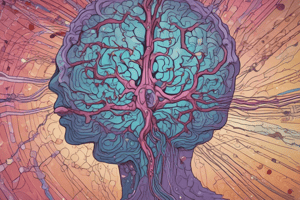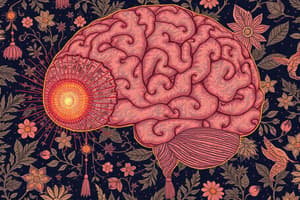Podcast
Questions and Answers
What is the primary characteristic feature of epilepsy?
What is the primary characteristic feature of epilepsy?
- Migraines
- Visual disturbances
- Recurrent seizures (correct)
- Loss of smell
What distinguishes an epileptic seizure from a regular seizure?
What distinguishes an epileptic seizure from a regular seizure?
- The location in the brain where it originates
- The presence of abnormal neuronal firing (correct)
- The duration of the seizure
- The intensity of the symptoms
Which type of epilepsy involves seizures originating in both hemispheres of the brain simultaneously?
Which type of epilepsy involves seizures originating in both hemispheres of the brain simultaneously?
- Focal epilepsy
- Secondary generalized epilepsy
- Primary generalized epilepsy (correct)
- Unknown etiology epilepsy
What is the main cause of seizures in the case of epilepsy?
What is the main cause of seizures in the case of epilepsy?
What type of discharge in the brain leads to seizures in epilepsy?
What type of discharge in the brain leads to seizures in epilepsy?
What is the primary focus of epilepsy treatment?
What is the primary focus of epilepsy treatment?
Which test is commonly used in the diagnosis of epilepsy?
Which test is commonly used in the diagnosis of epilepsy?
What is the percentage of people diagnosed with epilepsy in their lifetime?
What is the percentage of people diagnosed with epilepsy in their lifetime?
In what type of countries is there a higher treatment gap for people with epilepsy?
In what type of countries is there a higher treatment gap for people with epilepsy?
What physical sign is NOT commonly associated with epileptic seizures?
What physical sign is NOT commonly associated with epileptic seizures?
How does discontinuing antiseizure medication in epilepsy treatment usually occur?
How does discontinuing antiseizure medication in epilepsy treatment usually occur?
Study Notes
Epilepsy: Understanding the Condition
Epilepsy is a neurological condition characterized by recurrent seizures or the tendency to generate epileptic seizures. It is one of the most common chronic neurological disorders, affecting around 50 million people worldwide. Epilepsy is a diverse condition, with various causes and seizure types, and its impact on individuals varies greatly.
Definitions and Classification
A seizure is a paroxysmal alteration of neurological function caused by excessive, hypersynchronous discharge of neurons. An epileptic seizure is a seizure caused by abnormal neuronal firing, while epilepsy is the condition of recurrent, unprovoked seizures.
Epilepsy can be classified into several types, including:
- Primary generalized epilepsy: Seizures arise from both hemispheres of the brain simultaneously.
- Focal epilepsy: Seizures originate in one part of the brain.
- Unknown etiology epilepsy: The cause of the seizures remains unknown.
Pathophysiology
Epilepsy occurs when there is an imbalance in the normal electrical activity of the brain. This imbalance can lead to excessive electrical discharges in groups of brain cells, causing seizures. The underlying causes of epilepsy are diverse, including genetic factors, developmental brain abnormalities, infections, traumatic brain injuries, strokes, brain tumors, and other identifiable problems.
Clinical Signs and Symptoms
Epileptic seizures can manifest differently depending on the location of the epileptic discharges in the cerebral cortex. Symptoms can range from mild (loss of awareness or consciousness, sensory disturbances) to severe (convulsions, loss of consciousness, prolonged seizures). People with epilepsy also tend to have more physical problems and higher rates of psychological conditions like anxiety and depression.
Diagnosis
Diagnosis of epilepsy involves taking a detailed history, physical examination, and often additional tests such as an electroencephalogram (EEG), neuroimaging, and genetic studies.
Treatment
Epilepsy treatment focuses on controlling seizures with antiseizure medications. The aim is to achieve seizure freedom with appropriate medication use. Discontinuing antiseizure medication can be considered after a certain period without seizures, with factors such as social and personal circumstances taken into account.
Prognosis
Epilepsy is a chronic condition, and the prognosis varies depending on individual factors. Epilepsy can be associated with a range of co-existing conditions, impacting daily life and quality of life.
Epidemiology
The lifetime likelihood of experiencing at least one epileptic seizure is about 9%, and the lifetime likelihood of being diagnosed with epilepsy is almost 3%. The prevalence of active epilepsy is about 0.8%. In low- and middle-income countries, about 80% of people with epilepsy live, and there is a significant treatment gap, with only a fraction receiving the necessary treatment.
Conclusion
Epilepsy is a complex neurological condition with a wide range of manifestations and causes. Despite its prevalence and impact, there is still much to learn about the condition, with ongoing research focused on understanding the underlying mechanisms and developing new treatments.
Studying That Suits You
Use AI to generate personalized quizzes and flashcards to suit your learning preferences.
Description
Explore the basics of epilepsy, a neurological condition characterized by recurrent seizures. Learn about the definitions, classification, pathophysiology, clinical signs, diagnosis, treatment options, prognosis, and epidemiology of epilepsy.




